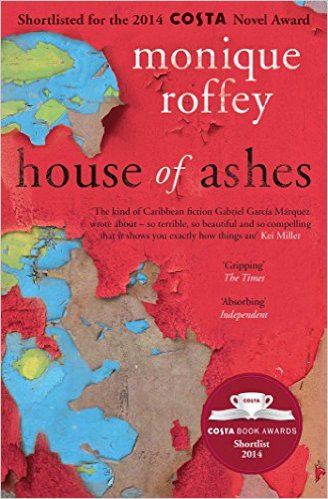
Although House of Ashes grew on me, so did a suspicion that Roffey would take cover in a spiritual resolution to her book. It certainly fits her attempt to deal out the moral goods even handedly (see my 19.1.16 blog on morality in novels). Difficult in a setting like the Caribbean (a fictional island doesn’t relieve it of its history), which has been subject to as much depredation as anywhere in the ex-colonial world – did Roffey, born and brought up in Trinidad, want to give her imagination a holiday after her 2010 The White Woman on the Green Bicycle? Would making a novel out of the 1990 Trinidad coup attempt have required her to abandon her personalised take on morality which leaves all of her characters both innocent and guilty?
An armed band of young men, led by the Leader and his right hand man Hal, take over The House of Power in the island of San Amen’s capital City of Silk. They kill, maim and take government ministers and personnel hostage. They leave the House of Power after a week of horror. The story is told by one of the boy gunmen and one of the government ministers. A third narrator, another of the gunmen as he is today, concludes the book.
It’s excellently and cleanly written. The tension and filth inside the House of Power – no toilets working, no food, rotting bodies – builds enticingly. The climax, for those like myself who don’t know much Trinidadian history, is unknown. Would the army slaughter all the boys? Would the boys slaughter all the government people? Would the PM, one of the hostages, die of insulin deprivation? Would Ashes, the gunman narrator, escape? And what about the relationship developing between Breeze, 15, rescued from the streets by the Leader, and Aspasia, environment minister and mother of a girl and boy? Breeze is capable of rape and worse. Roffey rides the ambiguities high and dangerously.
Her cleverest trick in moral distribution is to give Aspasia a first person voice, Ashes an exclusive third person pov, and the ending of the book to a third narrator. She thus evenly distributes the reader’s sympathies. The boys have been duped by the Leader and his spiritual patina, but are responsible for atrocities. The government personnel are brave and kind but are responsible for IMF deals and the island’s majority impoverishment. The Leader is vain and ambitious. At least one of the gunmen is a mad ex-con.
The Trinidad coup was propelled by a home grown version of Islam, something like the Nation of Islam which attempted to give poor Black lives at least spiritual value. Roffey creates a hybrid of Islam and Christianity to do the same job. Most of the time it’s convincing.
Without giving the conclusion away, for Roffey is a very good story teller, I have my doubts, however, about her reliance on spiritual redemption and her restricted exploration of the idea and fact of power. She’s an optimist, always possible if you don’t take the personal too near the political.
